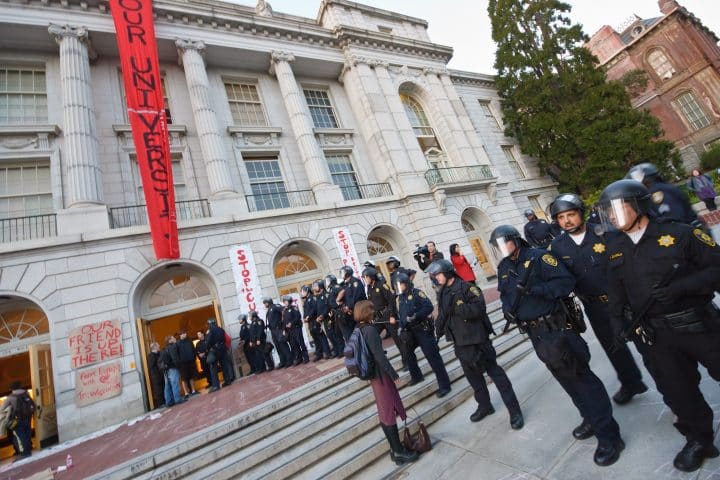The United States and Human Rights have a long and complicated history. Over the last couple of centuries, their Facebook status has fluctuated between single, in a relationship, and it’s complicated. Yet, they have needed each other. The U.S. needed Human Rights to “pass the test” on being a legitimate global superpower, and Human Rights needed the U.S. to gain visibility and influence. Simply put, the U.S. needed the community service credit, and Human Rights needed the popularity– a relationship dynamic you might recognize from the high school romcoms of the 2000s.
Despite their rocky relationship, the two have generally attempted to uphold an image of “going steady” to the world. Until recently. It seems that their latest blow-up has been a little too big to hide from their friends. Herein lies the million-dollar question: will the couple be able to come back from this and make up? Or does this mean a final break-up, once and for all? It’s time to psychoanalyze the United States– to see if it has what it takes to be a good partner.
As Any Legitimate Therapist, I Know the Limits of My Work
Relationships are complicated, and it takes years of therapy to truly understand the myriad of dynamics at play, let alone work through a couple’s problems. And therapy’s expensive– don’t expect this article to provide all that for free. Given this, I will be the first to admit that there is much nuance left out of the following discussion, so let’s be clear: the goal of this therapy session is to provide a space for exploration and to provoke thought, not to document a detailed history of the patient or make a diagnosis.
Regardless, when it comes to psychoanalysis, a clear framework is key. Hence, it must be clarified that when I say the United States, I mean the U.S. as a political institution (rather than its people, many of whom have fought long and hard for justice), and when I say Human Rights, I mean Human Rights as international norms (rather than the systems that struggle to implement them).
While the language of relationships and therapy might feel playful at times, the issues it represents are not to be taken as such. Using satirical metaphors isn’t about trivializing politics or Human Rights, but rather about finding new ways to frame and understand these topics (accessibility within academia and politics having their own issues, which could also benefit from some therapy, might I add). Think of it as metaphor therapy (it’s a real thing), helping us to gain alternative insights into seemingly unresolvable challenges. In this office, we support creative expression.
Childhood Trauma: The Circumstances of the U.S.’s Birth
Modern psychology suggests that unresolved trauma shows up in our adult relationships; we are doomed to repeat dysfunctional patterns from our childhood if we don’t take the time to heal. The United States is no exception, clinging to an identity of liberty and justice, yet born out of slavery, genocide and displacement, exclusion and inequality, settler colonialism, and imperialism. As follows, the U.S.’s youth is full of contradictions, manifesting in its relationship with Human Rights today.
A line quoted in many a therapist’s office reads, “real intimacy begins when the masks come off, and the past is no longer off-limits”. Herein lies a major red flag of the United States: a pattern of minimizing and ignoring its past, and subsequently, its present. A healthy relationship necessitates accountability– this includes being honest about one’s history, especially when said history risks affecting a partner. For the U.S. and Human Rights to truly make it as a couple, the U.S. must be willing to acknowledge harm, make amends, and heal its past.
On Again, Off Again
The relationship between the United States and Human Rights is tumultuous, to say the least. On-again, off-again: like Ross and Rachel, but worse. Let’s just hope that the U.S. is able to gain as much sense as Ross eventually did and find its way back to Rachel (Human Rights), instead of ending up with Emily (colonial, oligarchal, isolationist capitalism) forever.
So, what exactly is getting in the way of this couple’s stability?
As any therapist worth her salt will tell you, a healthy relationship is built on trust. Once trust is broken, it must be built back up. Unfortunately, Human Rights has seen the U.S. make bold declarations of love without follow-through a few too many times; much of the trust that Human Rights could have had in the U.S. as a supportive and loyal partner has been betrayed.
Even when the U.S. has stood up for Human Rights, such gestures have often been tainted by ulterior motives and double standards– condemning violations of Human Rights as wrong in certain circumstances, while turning a blind eye to others. Too many times, the U.S. has justified involvement in geopolitical conflicts as a gift to Human Rights, only to further its own political agenda.
The gaslighting doesn’t help. The U.S. strings along Human Rights, throwing breadcrumbs framed as bread loaves. And when called out, it’s got all the classic phrases locked and loaded: “you’re too sensitive”, “you’re just being paranoid”, “stop overreacting”. The U.S. portrays its own divisiveness— namely, its use of Human Rights for personal gain— as a commitment to their relationship. And still, when Human Rights stands up for itself, all it gets back is a “I can’t believe you would accuse me of this after everything I’ve done for you”.
How to Lose *Human Rights* in 10 *Years*
Kate Hudson and Matthew McConaughey showed us that even a relationship with divisive origins has the potential to turn into something real. Could the same be true for the U.S. and Human Rights? Unfortunately, as they say, life is not a movie. Yes, despite the fact that their relationship has always been rocky, the twentieth and twenty-first centuries have shown some potential for realness. However, the past (approximately) 10 years have tested the foundation of their relationship: a barometer of how much has really been healed and how much has been swept under the rug. Suffice to say, that rug is lumpy and people are tripping.
2025: This Time, We’re REALLY Over
While in the past, the U.S. has appeared to want to hide what’s going on behind closed doors, it’s come to a point where either that is no longer possible, or it just doesn’t care anymore. The U.S. has withdrawn from the U.N. Human Rights Council. It has slashed extensive sections of Human Rights reporting. It has eliminated DEI. It has stripped the rights of immigrants and trans people. It has effectively shut down USAID. I could go on.
Given the U.S.’s evident goal of growing as an economic superpower, it seems to be laying the classic line on Human Rights: “I need to focus on my career right now”. Where this stems from may be up for debate, but the U.S. is sending a clear message: Human Rights are not on its list of priorities. What’s more, the U.S. was added to the Human Rights Watch List. So, while the split may not be official, it’s definitely starting to feel mutual. Such recent events beg the questions: is a final, no-contact breakup inevitable? Or will the U.S. come to the realization that a successful career means nothing without someone to come home to and share it with?
Interventions and Choosing Sides: The Friend Group Weighs In
No breakup happens in a vacuum. Friends notice. The group chat gets busy. People gossip. Eventually everyone knows. So, what does the rest of the “friend” group have to say? Certain actors have praised the U.S.– take Hungary’s Prime Minister, for example, calling the current administration’s rise to power “a much needed victory for the World”. There are also those who have stayed silent, hoping either to keep the peace or protect their own interests; they may appreciate the friendship of Human Rights more than others, but their friendship with the U.S. has been too useful to cut off.
Others have had a different response, taking a page out of How I Met Your Mother’s playbook, staging interventions and calling out the U.S.’s behaviour, with NGOs like Amnesty International condemning its decisions as “reckless and performative”. Still others have tried to reason, or even confront the U.S., like Ukrainian President Zelensky voicing his disapproval over its peace proposals. A select few have tried to mediate, hoping the U.S. might eventually come around. But when a partner behaves the way the United States has as of late, it becomes harder and harder to believe they are still invested in the relationship.
Makeup or breakup? The future of Human Rights and the United States
So, what happens next? Can the U.S. make amends? Can it rebuild the trust, not just of Human Rights, but of the rest of its peers, as well? Can it turn its life around and prove that it’s really changed?
Unfortunately, therapy isn’t known for simple answers, and this is no exception. The future of this relationship depends on the U.S.’s willingness to change, not just its messaging, but its behavior. If the United States wants to put a ring on Human Rights’ finger, labeling them as a partner is not enough. It must respect and support them too.
All therapists want to have hope for their clients. Want to watch them heal and reconcile their pasts. I feel the same. But to do so, the U.S., like anyone in a relationship crisis, must start with honest reflection, clear communication, and the humility to admit when it’s fallen short. Human Rights may be forgiving, but the U.S. has a lot to make up for. Time will tell if it can step up and finally take some responsibility. But one thing is for certain: Human Rights deserves a partner who shows up no matter what. In sickness and in health, as the line goes.
↓ Image Attributions
“Guantanamo Bay protest” by Victoria Pickering // Licensed under CC BY-NC-ND 2.0




